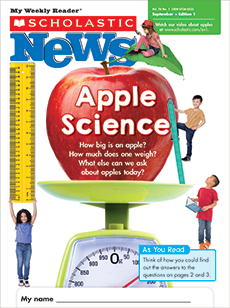Academic Standards
Learning Objective:
Children will compare different-sized pumpkins and determine their favorite.
Science Focus:
plants
Page 4 Skill:
read a diagram
Vocabulary:
weighs, forklift, float
CCSS:
RI.1.1 ask and answer questions; RI.1.4 determine meaning of words; RI.1.10 read informational texts; RF.1.2 vowels; SL.1.1 participate in collaborative conversations; L.1.1.F use adjectives
Watch the video
Watch the video
Build background knowledge by watching “Investigate Pumpkins.” When you’re done, ask students: What is one new thing you learned about pumpkins?
Preview new vocabulary words
Preview new vocabulary words
Project the online vocabulary slideshow and introduce this issue’s featured words.
Set a purpose for reading
Set a purpose for reading
- Have students do a picture walk through the issue. Then read and discuss the cover. Are students surprised to know pumpkins can be that huge? Have any students held a tiny pumpkin?
- Then, before turning to page 2, say, “As we read the article, think about which pumpkin you would want."
- Read each page stopping at the end of the page to discuss.
- Next, read the horizontally adjacent texts to focus on comparing and contrasting. Pause to discuss each category.
- Then students can share which size pumpkin they want.
- Complete the page 4 activity as a group or individually.
- When you’re done, do the Dance Break!
- Reading Checkpoint (skill: reading comprehension)
- Pumpkin Patch Hunt (skill: phonics)
- Venn Diagram (two levels) (skill: compare/contrast)
Deepen students’ learning with any of these supplemental activities:
Play the online game: Build Your Own Pumpkin
(skill: vocabulary)
Complete a hands-on activity: Paper Pumpkins
Kids use strips of paper to create their own paper pumpkin! (skill: fine-motor skills, following directions)
Read a paired text
Waiting is hard. But that’s exactly what one little pumpkin seed has to do in Little Boo by Stephen Wunderli! Students will relate to the little seed who can’t wait to be big and scary, while learning about the pumpkin life cycle.
